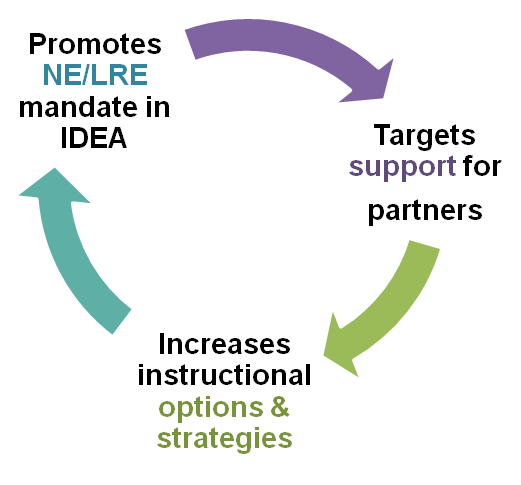Guidelines for effective collaboration in inclusive settings
Collaboration among partners in inclusive early childhood settings offers three essential benefits:

1. Collaboration promotes the mandate of natural environments and least restrictive environment in the Individuals with Disabilities Education Act.
Building on the knowledge and experience of all team partners lays the foundation for educating young children with disabilities with their typically developing peers in a variety of early childhood community settings .
2. Collaboration produces positive outcomes when early intervention or preschool special education and related services providers individualize support to early care/education and family partners by:
- focusing on partners’ issues and concerns;
- identifying and building on partners’ positive actions and interactions;
- encouraging partners to share observations about a child’s progress;
- making suggestions consistent with partners’ roles and learning styles;
- helping partners adapt their routines, materials, schedules and activities to meet children’s needs. McDonnell, Brownell & Wolery, 2001
3. Collaboration increases the effectiveness of instructional options and strategies.
Early childhood implementation teams share resources and skills via co-teaching, coaching, collaborative consultation, embedded intervention, integrated therapy and differentiated instruction.
Kathy, a speech language pathologist, discusses the benefits and challenges of using embedded intervention in a childcare program for Luke, a three year old boy with developmental delays.
Project Connect, Frank Porter Graham Child Development Center
Providing services in inclusive early childhood settings
Early intervention, special education and related service providers have refocused where and how they provide Extended IFSP/IEP services to preschool age children with disabilities, and their families. Current evidence based practices and federal/state laws and regulations mandate providing an early childhood education to preschool children with disabilities in inclusive early childhood settings with their peers, to the maximum extent possible.
Topics covered in Guidelines for effective collaboration in inclusive settings
Early intervention, preschool special education and related services personnel support family and early care/education partners in inclusive early childhood settings when they:
- Foster opportunities for partners to promote learning and interaction .
- Engage partners in planning and implementing intervention.
- Build on partners’ current skills and knowledge.
- Prompt reflection about a child’s participation and progress.

